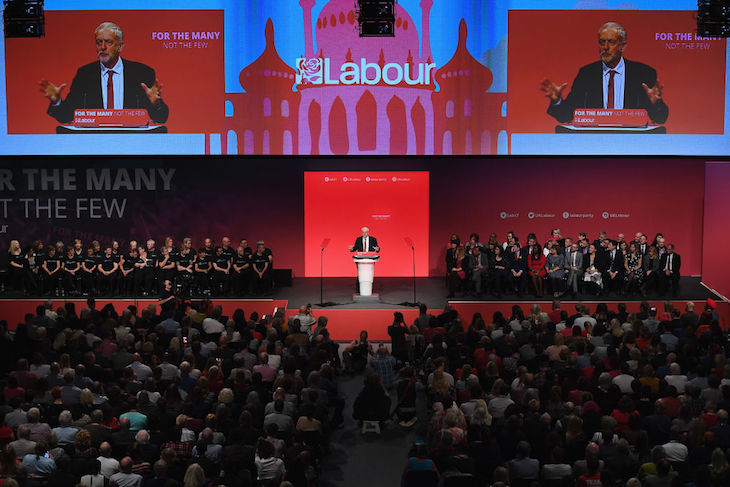Next time there’s a terrorist atrocity in Britain, here’s one of the things that will happen in the immediate aftermath: the mob will look for a scapegoat, someone wholly innocent of the actual crime but who must nonetheless bear the burden of its impotent rage.
Perhaps it will be a politician, usually Nigel Farage, though sometimes Donald Trump. More likely it will be Katie Hopkins or Tommy Robinson. They’ll say something robust and honest, most likely on Twitter. And instead of congratulating them on their courage in telling it like it is, the twitchfork mob will furiously brandish them as its Exhibit A — the hatemonger who created the atmosphere which made this terrible act possible. Meanwhile, the true perpetrators — at least in terms of moral responsibility — will be permitted to get off scot-free.
Quite why people behave this way, I find mystifying. But, as Ben Irvine describes in his fascinating book Scapegoated Capitalism, we’ve been doing it in different forms since time immemorial. On the Day of Atonement, as described in the book of Leviticus, two goats were sacrificed for this purpose: one was killed outright, the other cast into the wilderness, as in the William Holman Hunt painting. In ancient Athens, during the festival of Thargelia, they took it out on ugly men who were whipped around the genitals, then stoned and burned to death outside the city walls. In late 17th-century Salem, Massachusetts, it was ‘witches’ who got the blame. And so on.
Irvine is a Cambridge-educated philosophy PhD who was till recently a socialist. But as he started reading a bit more widely he began to question his righteous left-wing certainties. What if, far from being a response to the manifest injustices of broken Britain, it’s the anti-capitalist mindset that is actually causing these injustices?
I’d particularly recommend his book to any parent keen to deprogramme their Corbynista offspring with a few cold, hard, un-emotive case studies showing why and how big government tends almost invariably to make things worse.
In a series of chapters on welfare, education and, inevitably, the NHS, Irvine succinctly and damningly lays out the nature of the problem. And the problem is always the same: once the state gets involved, process and bureaucracy become ends in themselves. Departments established with the noblest of intentions — universal healthcare, schooling for our children, a safety net for the poor — quickly lose sight of their original purpose and instead become a bottomless money drain supplying the insatiable demands of a burgeoning class of parasitical hangers-on.
Only one third of the 1.5 million people currently employed by our state education system are actual teachers. The rest busy themselves creating box-ticking targets so onerous and tedious that 40 per cent of trainee teachers drop out within a year of starting.
It’s the same with the NHS, only about half of whose 1.4 million employees are actually doctors or nurses. The rest — on their inflated salaries and ring-fenced pensions — are monitoring patients’ racial profiles, or organising diversity seminars, or devising targets — or clever ways to avoid being penalised for not reaching those targets — or deciding which patients should benefit from rationed treatment and which should be left to suffer or die.
Overregulation constricts us, infantilises us and stops markets from functioning, as Irvine shows in his chapter about living in a cheap rented shed in someone’s garden in Cambridge. Until, that is, someone shopped his landlord to the authorities, as part of a government clampdown on the alleged ‘beds in sheds’ menace.
He writes: ‘Let’s get a few things straight. I choose to live in the garden room, because it is in my interests. My landlord chooses to rent it to me, because it is in his interests. He cannot afford to fully equip the room because this would require expensive planning permission. My landlord is himself an immigrant, and poor. He has — entrepreneurially — found a way to ease the housing crisis in Cambridge, and has mightily helped a writer like me (not to mention a succession of previous tenants who lived happily in the room).’
And, of course, he’s right. What’s missing from almost the entirety of government social policy — and has been for decades — is the concept of utility. That the state should intervene only when it can be sure of improving matters ought to be blindingly obvious. But it’s not obvious, say, when you’re a senior NHS manager on a vast salary which must at all costs be preserved, for where, outside the state sector, would you earn so much for doing something so pointless?
Nor if you’re a minister on a mission to show just what your department can do with a bit more money. Nor if you’re a taxi driver whose weekday regular, council-funded job it is to ferry registered truants to and from school. As Upton Sinclair said: ‘It is difficult to get a man to understand something, when his salary depends on his not understanding it.’
Even so, our broken, utterly unaffordable car crash of a system might yet — at a push — be capable of reform if enough of us fessed up to the nature of the problem. But we won’t. Why? Because, as Irvine posits, there are some problems so deep and intractable we’d simply rather not deal with them.
Instead, we vent our frustration on a convenient scapegoat — even, in the case of scapegoated capitalism, to the point of blaming the flawed (but better-than-all-the-other-options) system that has given us such abundance, freedom of choice and prosperity. Really, some of us just don’t deserve it. And pretty soon, if our politics carry on in the stupid direction they’re going in, we’ll no longer have it, either.







Comments